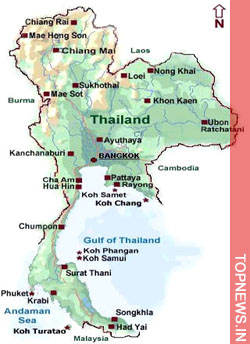Poor Thais hurt first in this economic crisis, economist warns
 Bangkok - If the 1997 Asian financial crisis was most painful for the relatively well-off, this time around, the poorest Thais are going to be hurt first, Ammar Siamwalla, the doyen of Thai economists, said Friday.
Bangkok - If the 1997 Asian financial crisis was most painful for the relatively well-off, this time around, the poorest Thais are going to be hurt first, Ammar Siamwalla, the doyen of Thai economists, said Friday.
"A decade ago, the rich were hit by a tremendous economic shock, [but] the crisis took time to hurt low income groups," said Ammar, a senior economist at the Thailand Development Research Institute think tank. "This time around, the pain is going straight to the grassroots."
Earlier hopes that Thailand might use its fecund agricultural sector to ride out the global financial crisis were dashed last month when the government said the economy shrank 4.3 per cent in the fourth quarter, making a recession inevitable this year.
The government subsequently slashed its economic forecast for 2009 to zero growth to a 1-per-cent contraction after earlier predicting growth of 3 to 4 per cent.
In 1997, Thailand's dynamic export sector, responsible for two-thirds of its gross domestic product, helped mitigate the effects of a currency crash that bankrupted a swath of banks and rich families. In 2009, the much broader global financial crisis offers no such refuge.
"Our exports are heading strongly downwards," Ammar said. "It will obviously be very difficult to replace that demand one-for-one."
Yet in a discussion paper written for the United Nations, Ammar and co-author Somchai Jitsuchon, rejected direct government cash handouts or food coupons because the government currently finds it impossible to identity the truly needy. The authors explained their findings to a meeting of economic planners Friday.
Although Thailand has a famously large and elaborate bureaucracy, the state actually keeps little of the detailed information of ordinary citizens that might enable the authorities to discover the really poor as developed countries can, Ammar said.
Without any way of targeting needy Thais, the paper proposed using village and district committees to identify and help the needy. It also said some funds could be channeled through non-governmental organizations.
In the longer term, the government could find its suffering citizens by demanding that all working-age Thais be required to file a tax return or, alternatively, even the smallest enterprises employing just a single person could be made to join the national social security scheme. Only a minority of working Thais pay tax.
The Thailand Development Research Institute argued that although around 10 per cent of Thais are obviously poor, another 20 per cent of the population remained vulnerable to economic shocks and could easily slip in the category of dire need.
"Poverty in Thailand is very dynamic," the institute's Somchai said. "People rise out of poverty and slip back and later rise up again, so who do you help?"
Although Thailand has regularly recovered from economic crises over its modern history, the speed with which such shocks ripple through the economy has increased dramatically with the past two decades of globalization, said Ekniti Nitithanprapas, a senior expert in macroeconomic policy in the Ministry of Finance's fiscal policy office.
"Twenty or thirty years ago, we had time to adjust to a big economic shock because it took time for the full effect to hit home," Ekniti said. "Now everything happens very, very quickly. That is why we need to strengthen Thailand's core. We need better productivity, a better education system and smarter planning."
He added: "I used to think our fundamental strengths as a country would always protect us from the world," he added, "but this crisis shows us that the world is becoming more complicated, more challenging." (dpa)